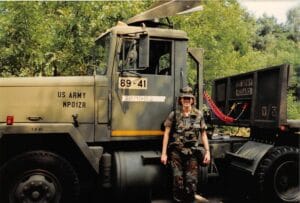
U.S. Army Veteran Michelle Melland began her career as a transportation officer after being commissioned in 1988. She spent four years on active duty, and was stationed for three of those years spent in Kaiserslautern, Germany, where she worked various roles in a battalion that hauled supplies throughout Europe. Later on, she would spend one year in the Army Reserve while attending graduate school at the University of Kansas. Eventually, she was able to use her logistics background at a trucking company, and was the primary breadwinner while her husband stayed home and took care of their twin girls.
But in 2011, she noticed that something was off. One day, she was playing volleyball and couldn’t tie her left shoes tightly enough. She initially dismissed it as her shoes being poor quality. Then, she began experiencing muscle twitches in her biceps. Eventually, her symptoms progressed and she went to a neurologist, who diagnosed her with ALS.
“I was angry, stunned, and devastated. The diagnosis was a death sentence that came out of nowhere,” she said. “I was healthy and active and I had two young daughters to raise. How could this be happening to me? Devastation quickly turned to resolve as my family and I decided to make the most of the time I have left. Fortunately, that’s turned out to be longer than I expected. I’ve come to terms with my ‘new normal’.”
Michelle has done the best to make the most of her life after her diagnosis. Initially, she spent hours Googling ALS looking for signs of hope, but since then, she has learned to “stay out of her head”. Eventually, she got into freelance writing as a way to keep her mind sharp as her body declined.
Today, Michelle’s ALS has progressed to the point where she can no longer walk, talk, or move her fingers, toes or head. However, she is able to communicate through a computerized eye-gaze technology that allows her to type out her thoughts on a keyboard. In addition to her freelance writing career, Michelle maintains a book review blog where she has written almost 160 book reviews.
Michelle credits PVA for helping her acquire the benefits she needed as she learned to navigate her new challenges. “I hold PVA in high regard. They know the ins and outs of the VA system and helped me at a time when I wasn’t really up to figuring out everything I needed to do to access my benefits,” she says. “They helped me access my benefits right after my diagnosis. And through the years they’ve helped understand and access additional benefits like adaptive housing grants and dependent tuition benefits.”
